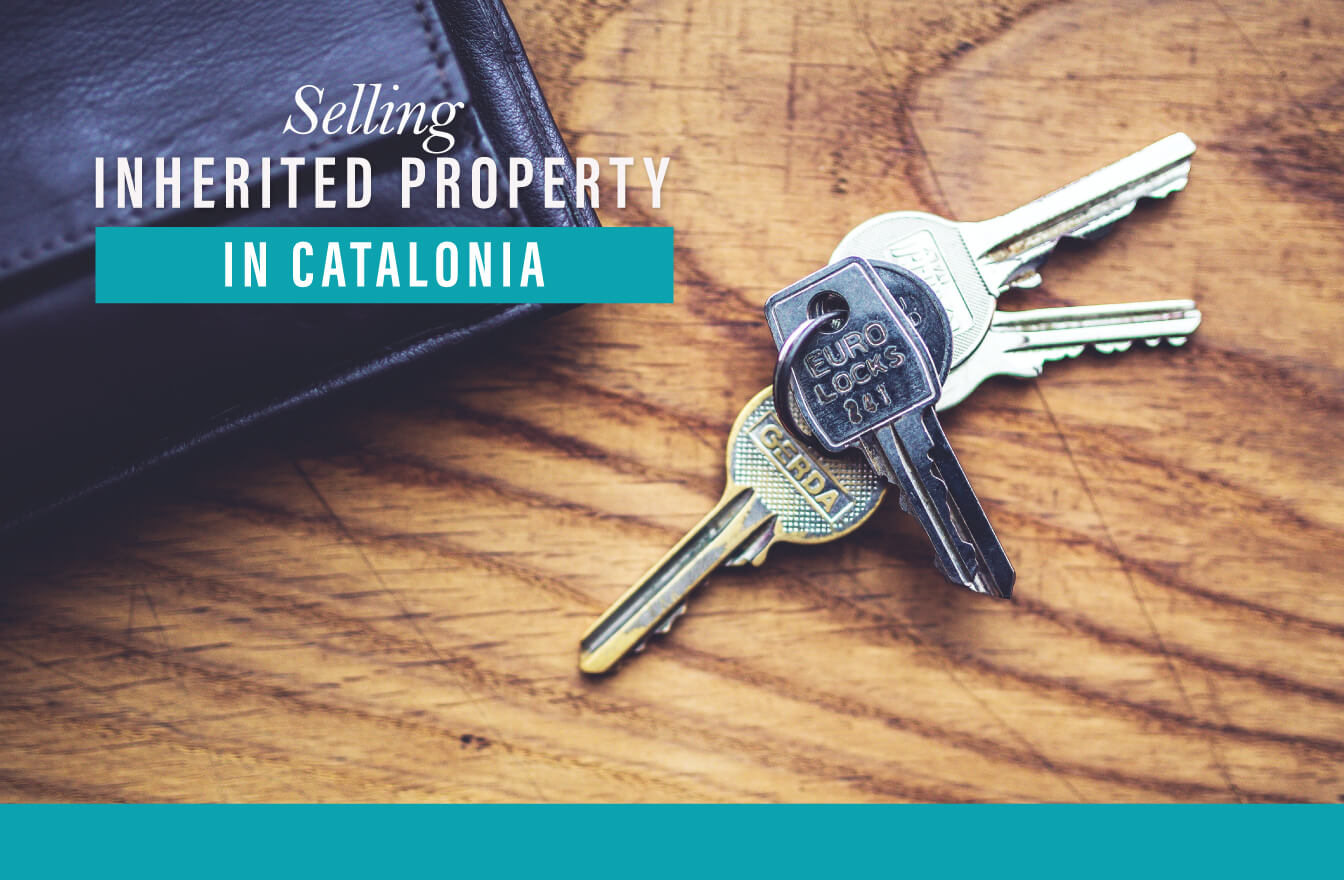
Selling an inherited house in Catalonia is arduous – our two steps below will give you an overview and links to everything you need.
If, on the other hand, you do not identify with this situation and you just want to know the requirements to buy a flat in Barcelona (the most important city in Catalonia), you can continue to find out more information on our blog or you can consult all the properties we have for sale.
Have you lost someone, and are thinking of selling an inherited house in Catalonia?
Strap yourself in tight. You’re in for a ride. Spain recorded the highest number of renunciations on inheritances in 2021 – some 56,667 which accounted for 13% of all inheritance procedures.
It’s hard to say which is more complex: the taxes on selling an inherited house, or the procedures for selling an inherited house in Catalonia. Many times inheritors cannot handle the taxes that come with inheriting a property. Sometimes inherited houses come with unforeseen debts.
And, even when an inherited property hits the market, you’re not yet out of the woods.
What happens if one of the heirs does not want to sell? Squabbles between family members attempting to sell an inherited house in Catalonia often lead to abandoned houses or lost capital – even in the most desirable parts of town.
Now that’s out the way, selling an inherited house in Catalonia should be a boon to your bottom line.
Whether you want to sell your house in Barcelona or in any other city in the Catalan territory, here are 2 simple steps to complete this complex procedure: register as owner and pay taxes.
Step 1: Register as the owner of an inherited house
To sell an inherited house in Catalonia you must be registered as the owner.
If you are not the sole inheritor of a property – and the sale will be split according to a will or to Catalonian law – then all co-owners must be registered in the relevant Registro de la Propiedad.
Here’s the procedures you’ll need to go through to register as the owner (or co-owners) of an inherited house:
You must have the testamento (will or testament) of the deceased
If there is no will, then an intestato (intestate) document must be created in which inheritance is awarded by blood rank as dictated by Catalonian inheritance law.
You must have the Certificado de Últimas Voluntades
This document confirms that a person has created a will, and must be signed before a notary. You can get this from the Ministry of Justice.
You must have the certificado de defunción (death certificate)
You can get this from the relevant Registro Civil (Civil Registry) in person, or online via this government link.
You must officially accept the inheritance
You can do this before a notary. If you’re the sole inheritor, you will need to sign the instancia de aceptación. If there are multiple inheritors, the documents to be signed before a notary are called the escritura de adjudicación or the escritura de aceptación de herencia. This document determines the percentage of which inheritances are applicable to which beneficiaries.
You must pay inheritance taxes
In this part, it is where the issue of commissions for the sale of the apartment or house applies. And there are two types of taxes applicable when inheriting a property in Catalonia: Inheritance and Gift Tax and Capital Gains Tax. See step 2 on taxes when selling an inherited home.
You must formalise your ownership of the property
With all the above documents and procedures fulfilled, you must then go to the relevant Registro de la Propiedad (regional property register) and register yourself or yourself and other inheritors as the owner/ co-owners of an inherited property.
Once you are officially registered as the owner – or collectively as co-owners – you may proceed with selling your inherited house.
Step 2: Pay taxes on selling an inherited house
Inheritance tax in Catalonia operates by the same principle as across all of Spain: the taxable entity is the person receiving the inheritance, not the deceased.
Find information below on two main taxes you need to consider: inheritance tax and capital gains tax.
(Note: you pay inheritance tax and capital gains tax before registering as the owner of an inherited house and pay capital gains tax again after selling your inherited house.)
How much inheritance tax do I pay when selling an inherited house?
If you are inheriting a house alongside other assets or goods, your inheritance tax will be calculated on the total value of all assets in the inheritance.
Inheritance tax in Catalonia ranges between 7% to 32% depending on the amount inherited (the taxable base is called base imponible in Spain). The taxable base is commonly reduced by any relevant deductions, though the existing net worth (patrimonio) of an inheritor is also factored in.
For example, the biggest reduction possible applies when the property inherited was the main family home of the deceased, and where the beneficiaries are the spouse, child or parent of the deceased. In this case, reduction of 95% on the base imponible is applied up to €500,000. So if the house is worth €400,000 the taxable base becomes reduced to €20,000.
(Note: If this 95% reduction is claimed, the property may not be sold for a period of 5 years. Bear this in mind if you’re set on selling your inherited home.)
There are still personal deductions relevant when selling an inherited house – these deductions can be up to €196,000 of the sale value. Deductions depend heavily on blood relations to the deceased and your age. You can read more about this in English from Spectrum IFA or via this official guide from the Catalan government in Spanish.
For example, the €196,000 reduction only applies to young children of the deceased.
Inheritance tax on an inherited house will be levied according to the property’s current value. You can read this official guide from the Catalan government on house valuations here in Catalan.
How much is capital gains tax when selling an inherited property?
Capital gains tax is obligatory, and must be paid after accepting an inheritance and before registering as the owner. The capital gain itself will be based on the valuation of the house’s current price during the procedure to pay inheritance tax.
If you are selling an inherited property you must pay capital gains tax twice: once to become its owner, and again after selling the property. Capital gains tax after selling a property must be paid within 30 days, while capital gains tax for an inherited house must be paid within six months of the death of the previous owner.
Capital gains tax in Spain depends on the municipality in which the house is registered.
You can get a rough idea of how much capital gains tax you need to pay when selling an inherited property – but first know there since 2021 there exist two different ways of calculating capital gains tax in Spain.
– The first is called the plusvalía real and can be calculated by subtracting the valor de transmisión (valuation of inherited house for inheritance tax purposes) from the valor de adquisición (sale price) and multiplying this by the valor catastral del terreno. You can find this figure on any municipal council tax (IBI) receipt.
– The second method to calculate capital gains tax is called the incremento objetivo de la base imponible del valor del terreno. This is calculated by multiplying the valor catastral del terreno by a coefficient dependent on how long the previous owner has owned the property, and which is determined by the relevant town hall. The Spanish Treasury establishes the coefficients starting at 0.14% if owned for less than a year and 0.45% when owned for 20 years or more.
What happens when you can’t pay the taxes for an inherited house?
Many times an inheritor cannot pay the inheritance and capital gains tax for an inherited house.
Remember: both inheritance tax and capital gains tax must be paid within six months after the death of the owner.
Rejecting an inheritance is common because any debts are also inherited. Outstanding mortgage repayments as well as municipal property taxes (IBI) are added on to the payment of inheritance tax to acquire a property left to you in a will. It is free to switch over a mortgage agreement to your name.
Sometimes there could be life insurance linked to the mortgage, in which case the insurance company will pay outstanding debts. Sometimes you can have abusive clauses in a mortgage agreement cancelled.
Sometimes, you’re on your own, and may need to take a loan just to inherit a house.
Not doing your homework on the taxes you have to pay when selling an inherited home is one of the main reasons why so many inheritances have been rejected in Spain in recent years.
Frequent questions related with selling an inherited house in Catalonia
Can I sell a house I inherit in Catalonia?
Yes, you can sell a house you inherit in Catalonia. Bear in mind there are two main taxes to pay – inheritance tax and capital gains – and also a series of procedures to carry out before you can put the inherited house on the market. See our two steps above to selling an inherited house in Catalonia.
Can I sell my part of an inherited house?
Yes, you can sell your part of an inherited house in Catalonia. You can choose to either sell your part of an inherited house before it is put on the market – either to another inheritor or to a third-party investor – or you can split the sale of a house among inheritors according to a will or inheritance laws.
Can I sell an inherited house before accepting it?
No, you cannot sell an inherited house before you have accepted an inheritance. Accepting an inheritance is a formal procedure in which documents must be signed before a notary. Without these documents, you cannot register as the owner of an inherited property. Without being the owner of an inherited property, you cannot sell it.
Can I sell an inherited house without registering as the owner?
No, you cannot sell an inherited house without registering as the owner. If you are not the owner of the house it could be because you have rejected the inheritance, in which case you give up your claim to the inherited house.
What happens if one of the heirs doesn’t want to sell an inherited house?
You cannot force a co-owner or inheritor to sell a house if they don’t want to. A house is not divisible, so the decision of one co-owner is the decision of all. What you could do as a co-owner is buy out the other inheritors and sell the house on your own terms. Where there is no agreement among co-owners, the house can be sold via public auction.



 The new capital gains tax in Spain
The new capital gains tax in Spain
 Top International Companies in Barcelona
Top International Companies in Barcelona
 Best real estate agency in Barcelona: How to choose it?
Best real estate agency in Barcelona: How to choose it?
